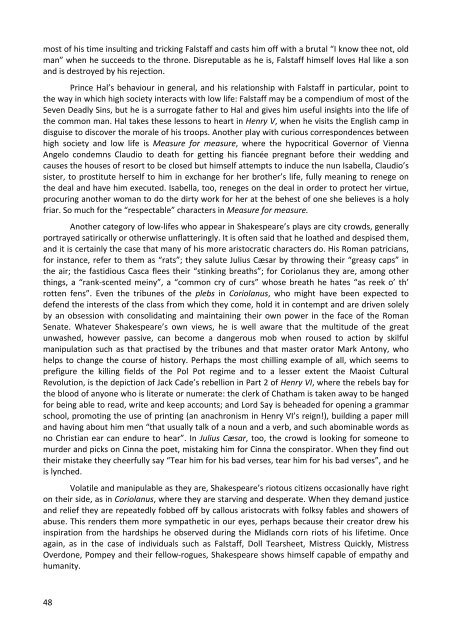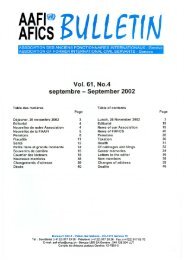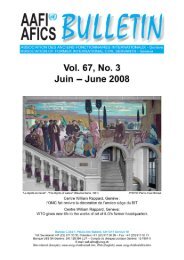VOL. 70, NO. 1 Janvier-- January 2011 - AAFI-AFICS, Geneva - UNOG
VOL. 70, NO. 1 Janvier-- January 2011 - AAFI-AFICS, Geneva - UNOG
VOL. 70, NO. 1 Janvier-- January 2011 - AAFI-AFICS, Geneva - UNOG
You also want an ePaper? Increase the reach of your titles
YUMPU automatically turns print PDFs into web optimized ePapers that Google loves.
most of his time insulting and tricking Falstaff and casts him off with a brutal “I know thee not, oldman” when he succeeds to the throne. Disreputable as he is, Falstaff himself loves Hal like a sonand is destroyed by his rejection.Prince Hal’s behaviour in general, and his relationship with Falstaff in particular, point tothe way in which high society interacts with low life: Falstaff may be a compendium of most of theSeven Deadly Sins, but he is a surrogate father to Hal and gives him useful insights into the life ofthe common man. Hal takes these lessons to heart in Henry V, when he visits the English camp indisguise to discover the morale of his troops. Another play with curious correspondences betweenhigh society and low life is Measure for measure, where the hypocritical Governor of ViennaAngelo condemns Claudio to death for getting his fiancée pregnant before their wedding andcauses the houses of resort to be closed but himself attempts to induce the nun Isabella, Claudio’ssister, to prostitute herself to him in exchange for her brother’s life, fully meaning to renege onthe deal and have him executed. Isabella, too, reneges on the deal in order to protect her virtue,procuring another woman to do the dirty work for her at the behest of one she believes is a holyfriar. So much for the “respectable” characters in Measure for measure.Another category of low-lifes who appear in Shakespeare’s plays are city crowds, generallyportrayed satirically or otherwise unflatteringly. It is often said that he loathed and despised them,and it is certainly the case that many of his more aristocratic characters do. His Roman patricians,for instance, refer to them as “rats”; they salute Julius Cæsar by throwing their “greasy caps” inthe air; the fastidious Casca flees their “stinking breaths”; for Coriolanus they are, among otherthings, a “rank-scented meiny”, a “common cry of curs” whose breath he hates “as reek o’ th’rotten fens”. Even the tribunes of the plebs in Coriolanus, who might have been expected todefend the interests of the class from which they come, hold it in contempt and are driven solelyby an obsession with consolidating and maintaining their own power in the face of the RomanSenate. Whatever Shakespeare’s own views, he is well aware that the multitude of the greatunwashed, however passive, can become a dangerous mob when roused to action by skilfulmanipulation such as that practised by the tribunes and that master orator Mark Antony, whohelps to change the course of history. Perhaps the most chilling example of all, which seems toprefigure the killing fields of the Pol Pot regime and to a lesser extent the Maoist CulturalRevolution, is the depiction of Jack Cade’s rebellion in Part 2 of Henry VI, where the rebels bay forthe blood of anyone who is literate or numerate: the clerk of Chatham is taken away to be hangedfor being able to read, write and keep accounts; and Lord Say is beheaded for opening a grammarschool, promoting the use of printing (an anachronism in Henry VI’s reign!), building a paper milland having about him men “that usually talk of a noun and a verb, and such abominable words asno Christian ear can endure to hear”. In Julius Cæsar, too, the crowd is looking for someone tomurder and picks on Cinna the poet, mistaking him for Cinna the conspirator. When they find outtheir mistake they cheerfully say “Tear him for his bad verses, tear him for his bad verses”, and heis lynched.Volatile and manipulable as they are, Shakespeare’s riotous citizens occasionally have righton their side, as in Coriolanus, where they are starving and desperate. When they demand justiceand relief they are repeatedly fobbed off by callous aristocrats with folksy fables and showers ofabuse. This renders them more sympathetic in our eyes, perhaps because their creator drew hisinspiration from the hardships he observed during the Midlands corn riots of his lifetime. Onceagain, as in the case of individuals such as Falstaff, Doll Tearsheet, Mistress Quickly, MistressOverdone, Pompey and their fellow-rogues, Shakespeare shows himself capable of empathy andhumanity.48
















